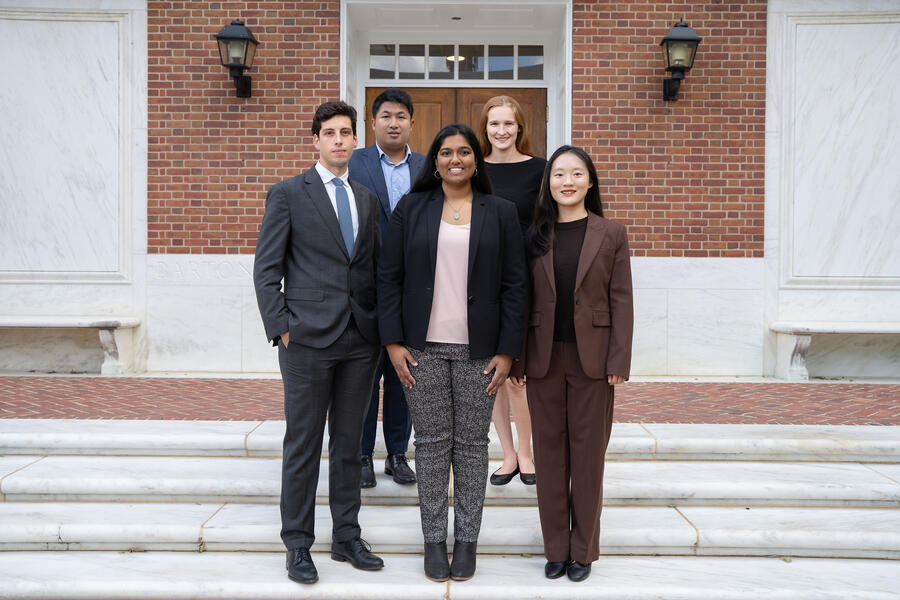Five Johns Hopkins doctoral students have been named 2026 Siebel Scholars, an honor that recognizes students in bioengineering fields for outstanding achievement in academia, research, and leadership.
Since its founding in 2000, the Siebel Scholarship has been awarded to 85 Johns Hopkins graduate students. This year, 78 scholars were selected from leading graduate schools to join an international network of nearly 2,000 researchers, scholars, and entrepreneurs. Recipients receive $35,000 to fund their final year of studies. Additionally, they're given the opportunity to attend annual conferences to discuss global issues alongside heads of state, scientists, and other experts seeking solutions to the world's most complex and pressing problems.
The 2026 Siebel Scholars from Johns Hopkins are:
Akshaya Annapragada
Akshaya Annapragada is an MD/PhD student in the Department of Biomedical Engineering. Annapragada holds an AB magna cum laude with highest honors in applied mathematics and an SM in bioengineering, both from Harvard. In her PhD work, which is advised by Victor Velculescu, Annapragada builds non-invasive blood tests for early cancer detection and novel machine learning methods to illuminate the "dark genome" of repeat elements. These technologies have led to five pending patents and a spin-off company Annapragada co-founded. Annapragada has authored 20 publications (nine as first author) in journals including Cancer Discovery, Science Translational Medicine, and Nature Medicine. Her honors include the AACR Women in Cancer Research Award, the National Institutes of Health F30 Fellowship, and Forbes "30 Under 30". Outside the lab, Annapragada co-founded The Community Health Literacy Project, leads the JHU Association of Women Student MD-PhDs, and was previously managing editor of the Harvard Political Review.
André Forjaz
André Forjaz is a PhD candidate in the Department of Chemical and Biomolecular Engineering, advised by Denis Wirtz, vice provost for research. In his research, Forjaz develops digital integrated artificial intelligence tools to study complex anatomical and molecular tissue changes in 3D. His research led to the discovery that ovarian precancers are significantly more common than previously believed: Most women will develop these lesions. He is a coauthor on 17 papers, including four as first author, and has presented at 13 conferences. As part of his research, Forjaz has mentored 11 undergraduate and graduate students. Outside research, Forjaz co-founded HOPTEC, an exchange program between Johns Hopkins and Instituto Superior Técnico in Lisbon, Portugal. He is responsible for interviewing applicants, inviting faculty seminar speakers, and planning an annual research symposium. Forjaz is the D.C.-Maryland-Virginia chapter leader of the Portuguese American Post-Graduate Society, where he organizes events to foster cultural exchange and scientific collaboration.
Jessica Stelzel
Jessica Stelzel is a PhD candidate in the Department of Biomedical Engineering in the Doloff and Mao labs, working to unravel the mechanisms behind biomaterials-induced tissue remodeling. Stelzel's highly collaborative research has resulted in authorship on seven publications, including four in Nature portfolio journals, and 14 presentations. She has received several prestigious awards, including the F31 Fellowship, NSF GRFP, and ARCS Scholarship. Stelzel is a Johns Hopkins Technology Ventures Commercialization Academy fellow and has interned at the SLAC National Accelerator Laboratory, a bioprinting startup, and the Navy's metallurgy branch. Stelzel is committed to mentorship, teaching, and advocacy. She has trained numerous PhD students, technicians, and undergraduates. As the manager of her center's flow cytometer, she has provided extensive flow training to over 50 students. She developed and taught an undergraduate immunology course and volunteers by teaching science lessons in Baltimore public schools. She has also held multiple student government leadership positions including committee chair, class representative, and secretary.
Kexin Wang
Kexin Wang is a PhD candidate in the Department of Biomedical Engineering with a concurrent MHS in biostatistics. Her research focuses on brain metabolism, where she develops advanced MRI techniques to non-invasively map metabolites without contrast agents. She bridges preclinical innovation with clinical application and applies statistics to explore image-based biomarkers. Wang pioneered creatine mapping in the human brain, contributing new insights into neurodegenerative diseases like Parkinson's. She has authored or coauthored over 10 papers and 10 abstracts as of May 2025, including six first/co-first-authored papers, with two more first-authored papers in preparation. Wang has actively contributed to the community by serving as president of the AWIS Greater Baltimore Chapter, where she advocates for a supportive and inclusive local STEM environment. She also co-founded BioCosmo, a nonprofit organization that supports Chinese international biomedical researchers in the U.S. She has reviewed papers over 26 times and served on multiple conference abstract review panels.
Yining Zhu
Yining Zhu is a fourth-year PhD candidate in the Department of Biomedical Engineering. He was nominated for the Siebel Scholarship by his PhD adviser, Hai-Quan Mao, a professor in the Department of Materials Science and Engineering in the Whiting School of Engineering and director of the Johns Hopkins Institute for NanoBioTechnology. Zhu engineers lipid nanoparticle platforms for gene therapy and mRNA vaccines, crafting formulations that reprogram immunity and enable precision genome editing. His portfolio spans 28 publications—eight first-author papers in Nature Biomedical Engineering, Nature Chemical Engineering, and Nature Communications—plus seven conference abstracts. Zhu has nine issued patents, several licensed by EMC2 Bio and evaluated by Bluebird Bio, Sartorius-Polyplus, and Evonik, highlighting his translational impact, while nationwide collaborations with clinicians accelerate clinical adoption. Honors such as a Young Investigator Award and two Society for Biomaterials STAR Awards recognize his scientific leadership. Drawing on skills honed as president of his undergraduate student union, he now strengthens the Johns Hopkins community as a lab captain, mentors NSF-REU trainees and junior graduate students, teaches the intersession course "Introduction to Nanomedicine," and volunteers as a Peer Health Navigator to support student mental health.
Posted in Science+Technology
Tagged siebel scholars, awards, graduate students








